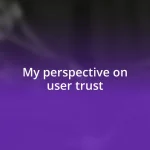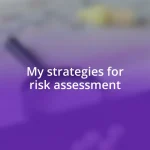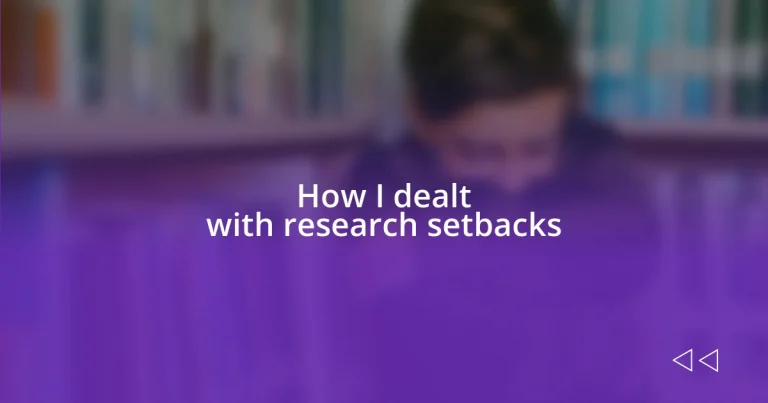Key takeaways:
- Setbacks in research are common obstacles that can foster resilience, drive methodological improvements, and lead to innovative solutions.
- Maintaining a positive mindset through strategies like gratitude, visualization, and connecting with peers can significantly enhance perseverance during tough times.
- Effective time management and proactive problem-solving approaches, including setting priorities and creating contingency plans, can transform challenges into manageable tasks.
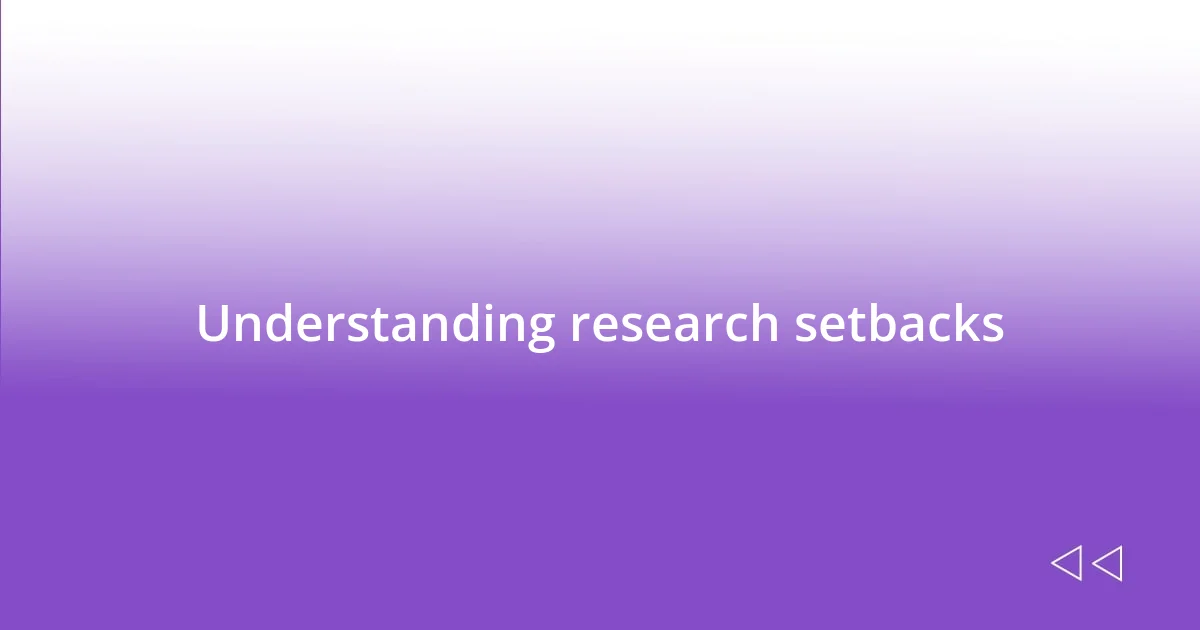
Understanding research setbacks
Research setbacks can be incredibly frustrating, often leaving us feeling disheartened. I remember a time when an entire dataset I had painstakingly gathered vanished due to a software glitch. It’s in moments like these that I found myself asking, “Why does this always happen to me?” But I learned that setbacks are a universal part of the research journey.
When I think about setbacks, I realize they often serve a greater purpose in our work. Each obstacle has forced me to take a step back and reevaluate my approach. For instance, when faced with unexpected outcomes, I’ve had to dig deeper into my methodology, which ultimately led to more robust findings. Has an unexpected result ever prompted you to discover something new?
Emotions run high during these challenging times. One day, after an exhausting week of experiments that yielded no significant results, I felt ready to throw in the towel. However, I chose to turn that frustration into motivation, seeking advice from colleagues and rethinking my strategies. It’s these moments of vulnerability that often lead to breakthroughs, reminding us that persistence is key in research.
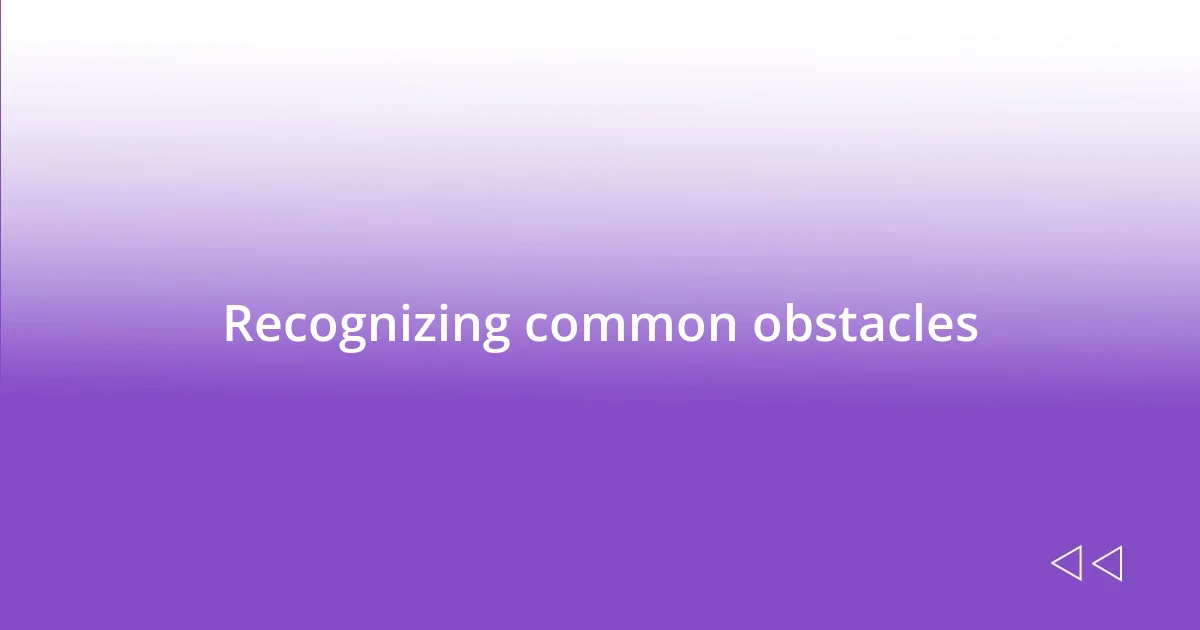
Recognizing common obstacles
Recognizing common obstacles in research can truly feel like navigating a minefield. From personal experience, I’ve encountered a myriad of challenges, whether it was funding restrictions that pummeled my project plans or miscommunications with team members that led to critical delays. Each time a setback arose, I quickly realized that the key is being alert and adaptable. Have you ever had a moment where a simple misunderstanding turned a straightforward task into a Herculean effort?
One significant obstacle I faced involved data collection methods that were initially misaligned with my research goals. It felt like running a marathon only to discover I was on the wrong track altogether. This awareness prompted me to refine my tools and processes, which ultimately elevated the quality of my work. Recognizing that it’s okay to adjust our methods is a powerful lesson I hold onto. I wonder if this resonates with other researchers facing similar hurdles.
Technical glitches are another common stumbling block that can derail our progress. I vividly recall a time when a faulty piece of equipment rendered weeks of experimentation useless. At that moment, I was faced with two choices: wallow in frustration or take decisive action. By leaning into problem-solving mode, I not only fixed the issue but also developed contingency plans for future experiments. This experience taught me the value of resilience and the importance of preparing for the unexpected.
| Common Obstacles | Personal Experience |
|---|---|
| Funding restrictions | Funding limitations forced me to rethink the scope of my project, ultimately leading to more focused research. |
| Mistakes in data collection | A realization about flawed methods drove me to improve my approach, enhancing the overall quality of my research. |
| Technical glitches | A malfunctioning device once wasted a month of effort, pushing me to establish backup procedures that paid off in future projects. |
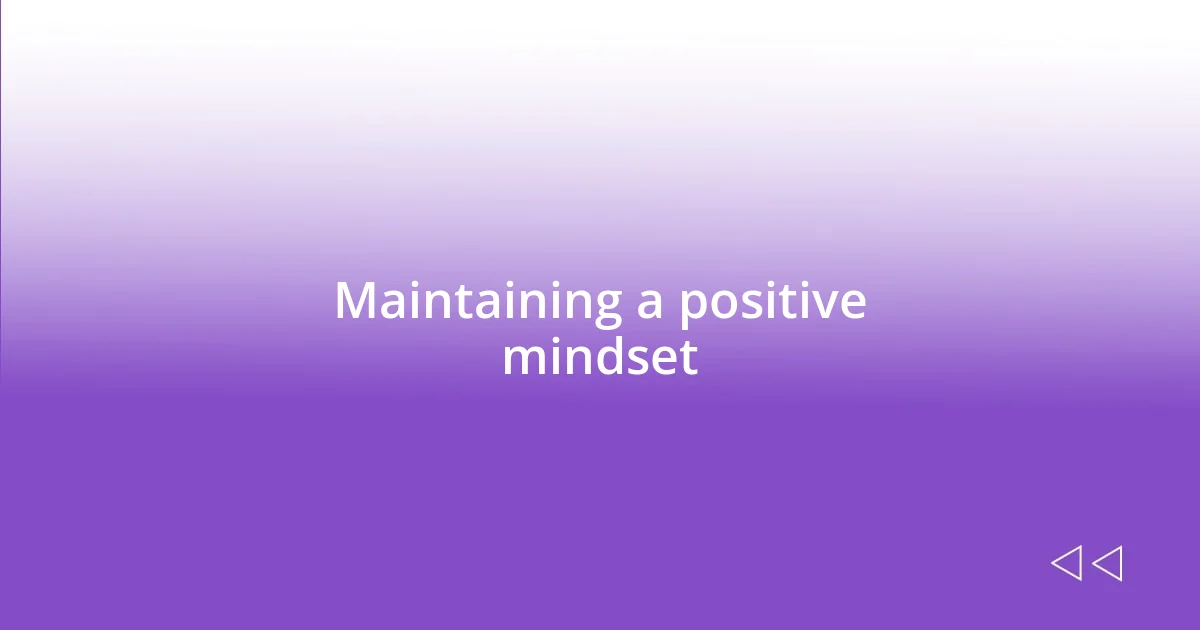
Maintaining a positive mindset
It’s easy to succumb to frustration when faced with setbacks, but I’ve learned that maintaining a positive mindset is essential. I vividly remember a particularly rough patch during my research when I was overwhelmed with negative thoughts. I took a moment to breathe and remind myself of my long-term goals. Shifting my perspective was key—I realized that hurdles were not roadblocks but opportunities for growth.
Here are some practical strategies that have helped me stay positive during tough times:
- Practice gratitude: Each day, I note down three things I appreciate about my research journey, no matter how small.
- Visualize success: I often close my eyes and picture the impact my work will make, re-energizing my motivation.
- Connect with peers: I share my experiences with fellow researchers, and their support has always lifted my spirits.
- Set small, achievable goals: Completing minor tasks allows me to celebrate little victories, which boosts my confidence.
- Embrace learning: I approach setbacks as lessons, reminding myself that each challenge offers valuable insights for future endeavors.
By focusing on these strategies, I find it easier to navigate the ups and downs of research, maintaining that spark of positivity that fuels my perseverance.
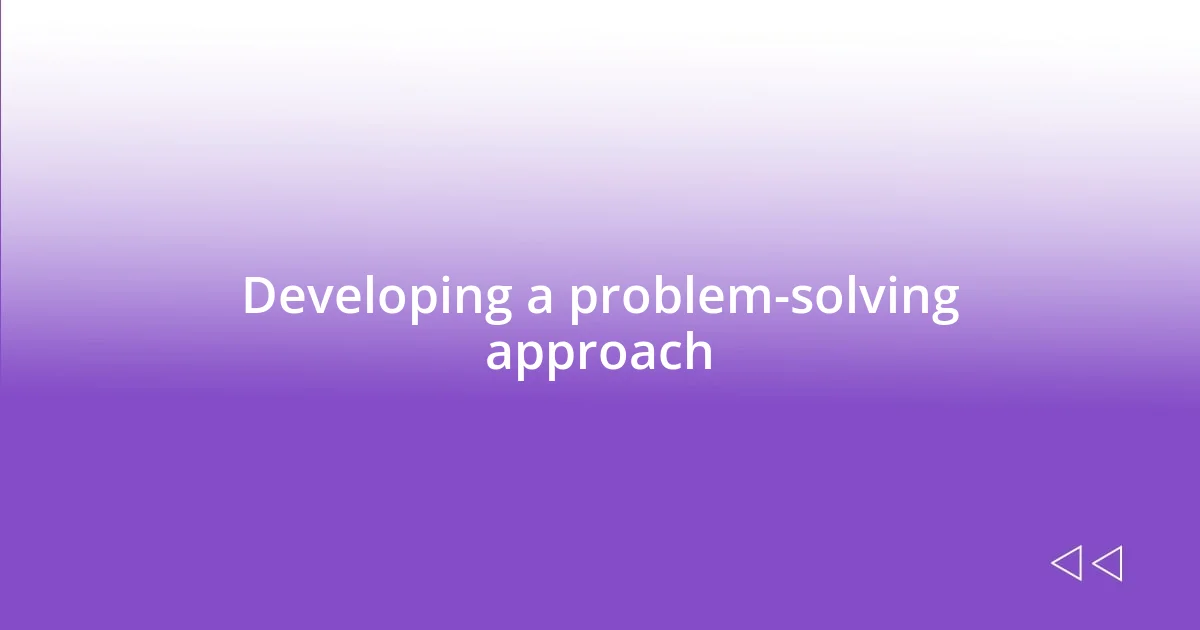
Developing a problem-solving approach
Developing a solid problem-solving approach is vital for any researcher facing setbacks. I remember a specific moment during my project when a critical software update caused unforeseen compatibility issues. I felt my heart sink, but I knew that panicking wouldn’t solve the problem. Instead, I took a deep breath and broke the issue down into smaller parts, which allowed me to isolate the error and devise a workaround. Have you ever experienced that rush of relief when you finally see a way through a problem?
Sometimes, it’s about embracing the unexpected. When a collaboration I was counting on fell through, I felt lost. But rather than letting it derail my progress, I brainstormed alternative methods and sources. This pivot not only salvaged my timeline but also connected me with new partners who offered fresh perspectives. I was struck by how setbacks can often lead to new beginnings—has that ever happened to you?
Ultimately, I’ve learned that developing a problem-solving mindset is about staying proactive rather than reactive. I often jot down potential challenges before they arise, creating a “what-if” plan. In one instance, this foresight saved me when I hit an unexpected snag with data interpretation. By preparing for the worst, I found clarity in the chaos. Don’t you think having a backup plan can be a game changer in navigating research hurdles?
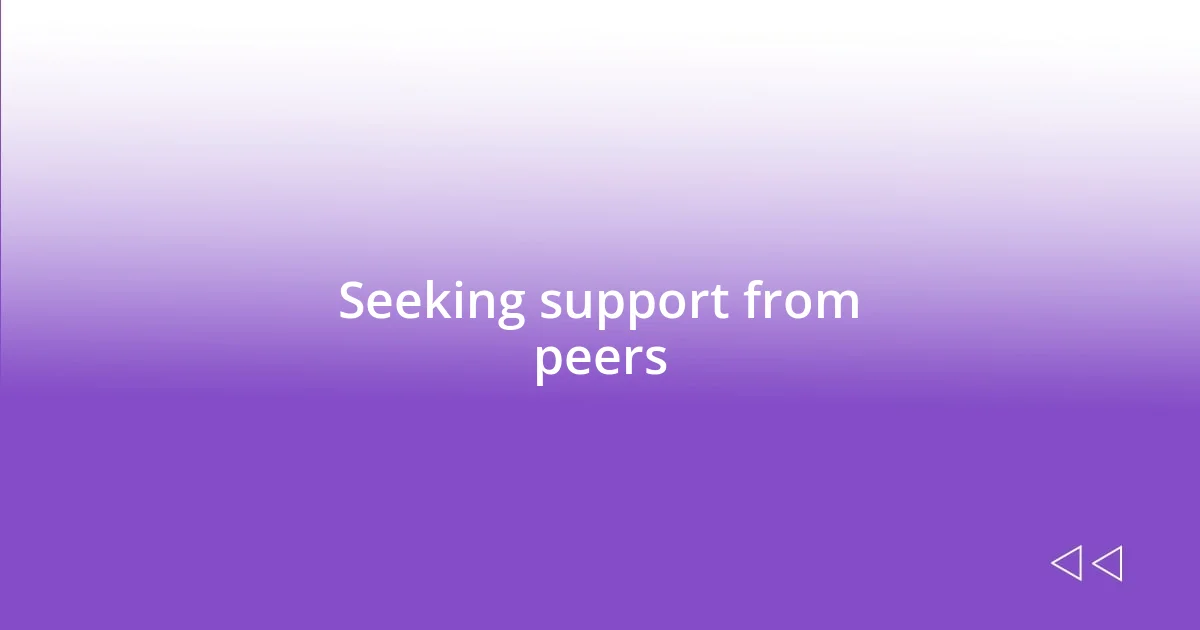
Seeking support from peers
Reaching out to peers has been one of the most rewarding parts of my research journey. I recall a time when I hit a wall, feeling utterly isolated in my struggles. One evening, I decided to attend a small research group meeting, and just sharing my experience sparked a wave of understanding and support from others. Their insights not only validated my feelings but also opened up new avenues I hadn’t considered. Have you ever experienced that moment when someone else’s perspective shifts your whole outlook?
Besides moral support, collaborating with peers has offered tangible solutions that I could never have arrived at alone. I remember a particularly complex analysis I was grappling with; a casually shared coffee break turned into a brainstorming session that unraveled my confusion. The ideas we bounced around, infused with different viewpoints, became the cornerstone of a breakthrough in my project. Isn’t it fascinating how a simple conversation can turn into a catalyst for innovation?
In those moments of seeking support, I often find that vulnerability can be a strength. Sharing my setbacks with others has created deeper connections and trust within my peer network. I’ve learned that asking for help doesn’t show weakness; it showcases a willingness to grow and learn. When was the last time you openly sought support, and how did it change your perspective? For me, that openness led to newfound friendships and collaborative opportunities that enriched my research experience immeasurably.
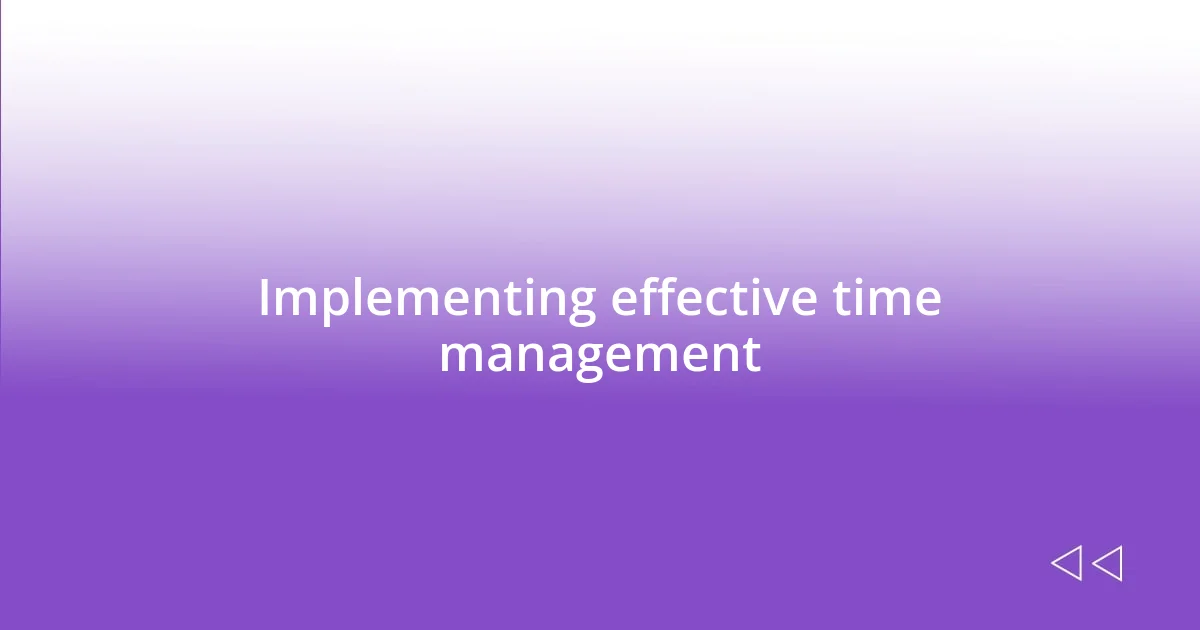
Implementing effective time management
Implementing effective time management has been crucial for me in navigating research setbacks. I recall grappling with deadlines during an experiment that didn’t go quite as planned. Instead of succumbing to stress, I embraced scheduling to allocate specific blocks of time for each aspect of my project. Have you ever tried breaking down your tasks into manageable chunks? I found that, when I did, it transformed overwhelming challenges into a series of small victories.
In one intense period, my results were delayed due to equipment failure. Frustration bubbled up, but I quickly decided to revise my timeline, incorporating buffer periods to accommodate potential hiccups. This adjustment not only alleviated the pressure but also allowed me the flexibility to adapt without losing the momentum of progress. It’s interesting how a little foresight can turn a chaotic schedule into a structured plan, isn’t it?
Over time, I’ve learned the importance of prioritization. I often ask myself, “What truly needs my attention right now?” By identifying high-impact tasks versus those that can wait, I can devote my energy where it matters most. Early on, I used to spread myself thin, but focusing on what moves the needle has led to remarkable productivity. Have you noticed how prioritizing can bring clarity amid the chaos of research? Trust me, embracing this strategy can elevate your efficiency and reinforce your confidence.
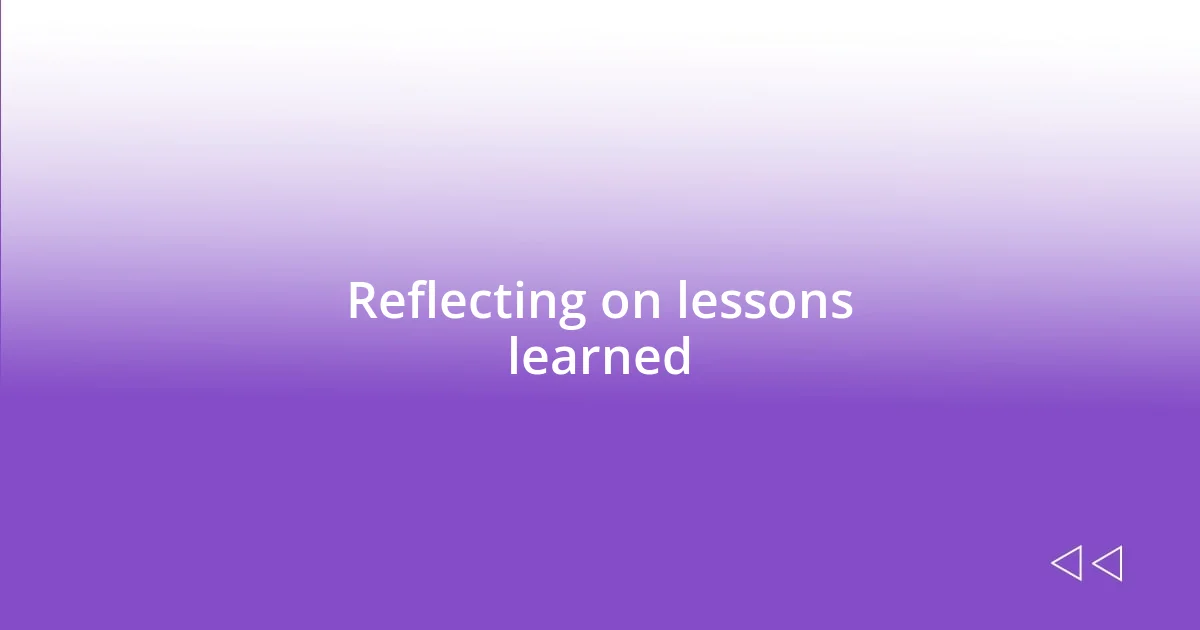
Reflecting on lessons learned
Reflecting on setbacks often reveals unexpected gems of wisdom. I remember looking back at a particularly frustrating month where everything that could go wrong did. As I mulled over those hurdles, I realized they pushed me beyond my comfort zone and encouraged me to explore alternative approaches. This period of frustration ultimately sparked a creative pivot in my methodology. Have you ever found growth in the midst of chaos?
One significant lesson I took away from setbacks is the importance of resilience. Each time I encountered a wall, I’d take a moment to breathe and reassess my strategies. The act of reflection became a powerful tool; it allowed me to sift through the chaos and identify what truly mattered in my research. I often ask myself, “What did this challenge teach me?” and I find that these reflections can transform a dashed expectation into a stepping stone.
Through this journey, I’ve learned that setbacks are not the end but rather a part of the scholarly process. I used to view them as signs of failure, but now I see them as opportunities for learning and growth. There’s something liberating about that shift in perspective. When I encounter difficulties, I now think, “What new skills can I develop from this?” It’s this mindset that keeps my passion ignited and motivates me to forge ahead, no matter how daunting the path may seem.





